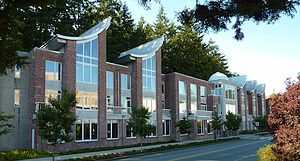Institute of Asian Research
The Institute of Asian Research (IAR) at the University of British Columbia is a research institute founded in 1978 and has been the foremost research centre in Canada for the inter-disciplinary study of Asia. With a broad geographic reach extending to China, India and South Asia, Japan, Korea and Southeast Asia, the Institute conducts research and teaching in policy-relevant issues informed by language and area studies. The Institute has played a central role in building UBC's excellence in research, teaching and community liaison in matters pertaining to Asia. The Institute has pursued a rich and productive research agenda on many aspects of the human experience in Asia.
The Institute's Master of Arts Asia Pacific Policy Studies (MAAPPS) program offers graduate students advanced training in policy analysis and research on current issues relevant to the Asia and Pacific Rim regions. Functioning as a "boutique policy school" the MAAPPS program combines applied learning elements with academic research to train future policy-analysts and policy-makers. The Institute also serves as a catalyst for inter-faculty and inter-departmental programs and projects on Asia, and has been a vehicle for building connections between Asia-specialist faculty at UBC and non-specialists who are working on Asia-related matters. The Institute contributes significantly to UBC's cooperation relationships with local community interests on Asia-related matters.
The Institute hosts five research centres: Centre for Chinese Research, Centre for India and South Asia Research, Centre for Japanese Research, Centre for Korean Research, Centre for Southeast Asia Research. These centres bundle the research activities on their respective countries/regions across the campus of the University of British Columbia. The Institute also hosts the Contemporary Tibetan Studies Program, and the Program on Inner Asia.
Institute of Asian Research Faculty
Faculty members at the Institute of Asian Research include some of the foremost experts on their area and region of expertise.
- Timothy Brook, Republic of China, Chair in Chinese Research
- Timothy Cheek, Louis Cha Chair in Chinese Research
- Julian Dierkes, Assistant Professor and Keidanren Chair in Japanese Research
- Paul M. Evans, Director of the Institute of Asian Research
- Abidin Kusno, CRC Chair in Asian Urbanism and Culture
- Hyung Gu Lynn, AECL/KEPCO Chair in Korean Research
- Jessica Main,Tung Lin Kok Yuen Canada Foundation Chair in Buddhism and Contemporary Society
- Masao Nakamura, Professor and Konwakai Japan Research Chair
- Kyung-Ae Park, Korea Foundation Chair in Korean Research
- Pitman B. Potter, Hong Kong Bank Chair in Asian Research
- Tsering Shakya, CRC Chair in Religion and Contemporary Society of Asia
- Ilan Vertinsky
Master of Arts Asia Pacific Policy Studies (MAAPPS) program
The MAAPPS program is organized into six thematic streams: Economic and Social Change, Security, Media, Gender and Development, Governance and Human Rights, and Infrastructure Policy. Students in the MAAPPS program have their own student organization, MAAPPSSA (Master of Arts Asia Pacific Policy Studies Student Organization). In 2009, a number of students in the program founded the Society for Asia Pacific Policy (SAPP) to promote student discussion on Asia Pacific policy-relevant issues through organizing and hosting the annual Asia Pacific Policy Graduate Symposium.
Asia Pacific Memo
Asia Pacific Memo features accessible scholarly knowledge about contemporary Asia. It's a communications initiative led by the Institute of Asian Research (IAR) at The University of British Columbia. Distributed twice-weekly, it features 350 word essays or video interviews. As of November 2011, more than 120 Memos have been published. Each edition is delivered by email to over 2,500 subscribers, and www.asiapacificmemo.ca attracts thousands of visitors each month. In addition, Asia Pacific Memo is active on YouTube, Twitter, and Facebook.
C. K. Choi Building

.jpg)
The Institute is housed in the purpose-built C. K. Choi Building in the northwest quadrant of the UBC campus. Designed by Matsuzaki Wright Architects of Vancouver, B.C., and completed in 1995, the building has been recognized for its leading-edge sustainable design.[1][2] It is the University of British Columbia's "flagship environmental building"[3] in what is calls its ‘living laboratory’, the campus used to showcase "innovative approaches to conserving energy, water and materials, while striving to make positive impacts on the environment."[4][5]
The building is named after Dr. Cheung-Kok Choi, a businessman and philanthropist in China, Hong Kong and Canada, and a major donor to UBC.[6][7] The building houses the Institute's five research centres which focus on China, Japan, Korea, Southeast Asia, and India and South Asia. The "daringly innovative architecture"[8] integrates cultural expression, interior and exterior architectural presence, together with environmental features and functions. The five identical curved roof forms reflect the Institute's Asian focus, providing an identifiable focus for each research centre without giving predominance to one culture or centre over another, and provide natural light and natural ventilation to interior spaces.[9]
References
- ↑ UBC press release 1996-10-06
- ↑ Cascadia Building Council
- ↑ Cole and Steiger, p.7
- ↑ UBC Sustainability
- ↑ The Canadian Encyclopedia
- ↑ IAR In Memoriam
- ↑ Community Leaders
- ↑ IAR History
- ↑ CascadiaBC